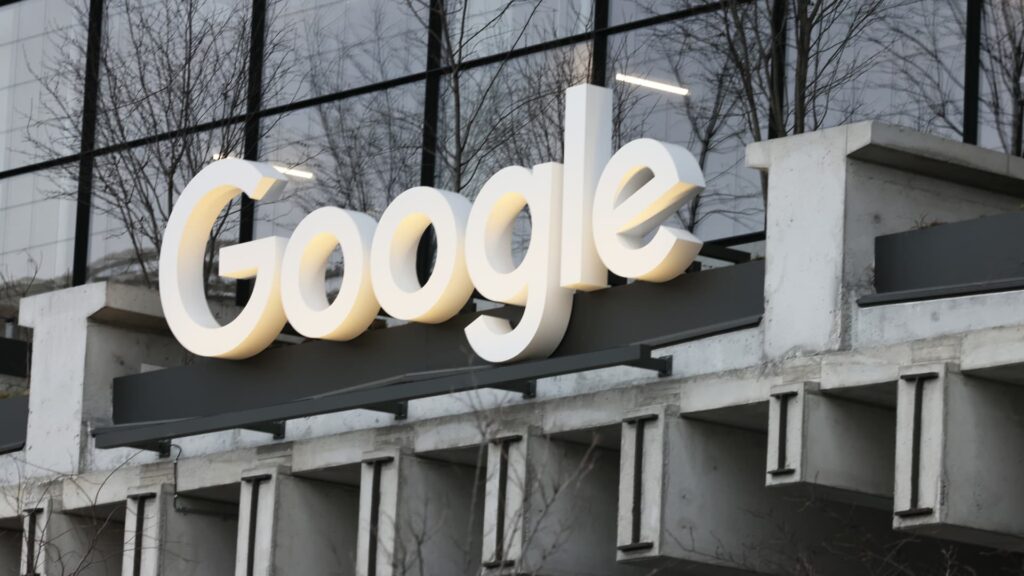Alphabet delivered better-than-expected fourth-quarter sales and earnings after the closing bell Tuesday. While there was some weakness in the key advertising parts of Google’s business, there was also a lot to like, despite the stock decline. Total revenue rose 13.5% year-over-year to $86.31 billion, outpacing the $85.33 billion expected, according to estimates compiled by LSEG. Earnings-per-share surged 56% to $1.64, exceeding the $1.59 expected. GOOGL 1Y mountain Alphabet 1 year In our view, this was an overall better-than-expected report that should see full-year estimates from Wall Street analysts move higher in the days to come. Shares were down 5.5% in after-hours trading as sellers seemed to want to focus on the ad revenue softness. Bottom line This was an overall solid result from Alphabet. However, it wasn’t enough to jump over the high expectations that come with a stock trading at all-time highs. Given that setup, the pullback we are seeing after hours was to be expected given that the advertising sales – Alphabet’s bread and butter – came up short. That said, we are encouraged by the strong rebound in Cloud sales and even stronger in Cloud profitability. We expect growth to continue as management works to bring the Gemini Ultra large language model to market. Google saw strong levels of engagement and demand in its vertically integrated artificial intelligence solutions, resulting in “new opportunities for Google Cloud across every product area,” the company said. Management also said on the post-earnings call that total subscription revenue reached $15 billion for the full year 2023, driven primarily by YouTube subscription growth which was helped by the NFL Sunday Ticket. In addition, cost management continues to benefit the bottom line as expense growth again came in below revenue growth and would have been even more favorable if not for a $1.2 billion charge taken during the quarter resulting from office space optimization. Operating income and margin performance, which missed expectations, would have also come in better than expected as well if not for that one-time charge. The only reason we’re seeing it in the results is because Alphabet reports GAAP numbers and therefore doesn’t adjust out costs like this. That’s unlike the vast majority of public companies. GAAP stands for generally accepted accounting principles, the gold standard in financials. Capital expenditures were higher than expected, but we’re reluctant to ding the team on this line item as it was largely driven by technical infrastructure investments – the largest portion being servers, followed by data centers – needed to build Cloud and AI capabilities. Capex is expected to be notably larger in fiscal 2024 versus 2023, which was expected. However, we also think big Capex spending increases pressure on management to demonstrate a material path toward monetizing investments in AI beyond simply enhancing existing product offerings like Microsoft doing with its Office suite AI assistant Copilot. (Club name Microsoft reported earnings Tuesday evening and also ran up against high expectations). While any improvements to existing Alphabet offerings are certainly welcome, we’ll watch for new offerings that can bring entirely new AI-oriented revenue streams. In terms of the “durable reengineering” of the cost basis, which is now in year two, CFO Ruth Porat said the work continues and that management is focused on improving operational efficiency by removing layers to “simplify execution and drive velocity.” As a result, we are seeing a slower pace of hiring and lower headcount versus the prior year – another positive in terms of continuing operational expenses. When a company’s stock trades at all-time highs, it needs to deliver on every line item. That’s not what we got from Alphabet. However, taking a step back we think the company is on the right track to improving profitability over time and realizing further subscription, AI, and cloud-driven revenue growth over time. We’re maintaining our 2 rating for the time being. No need to rush in just yet; let’s see what Meta Platforms has to say on the advertising market. (Meta reports after the bell Thursday.) Then, we can get a sense of where Alphabet shares will find their footing. We’re bumping up our Alphabet price target to $160 per share from $140, representing a 4% premium to Tuesday’s close and just over 23.4 times forward 2024 earnings estimates, which we think could be revised higher. At 23.4 times, that matches the five-year average forward price-to-earnings ratio. Quarterly commentary As we can see in the earnings table above, Q4 operating income of $23.7 billion (and the profit margin) came up short of estimates. But remember, that $1.2 billion charge relating to office space optimization was not adjusted out. If it had been, operating income and margin results would have been better than expected and earnings per share (EPS) would have been even higher. Traffic acquisition costs of $13.99 billion grew 8.2% year over year – a rate below the rate of sales growth, which we noted earlier was 13.5%. That speaks to improved margin performance on a go-forward basis. As for the Segment results, advertising was a bit disappointing. But expectations were very high coming into the print and clearly the Street got a bit ahead of itself. Google Search sales in Q4, by far the largest contributor to overall revenue, gained 12.7% to a lower-than-expected $48.02 billion. The misses in Google Search as well as YouTube ads and Google Network weren’t huge but misses, nonetheless. What was missed in advertising was more than made up for in Google Other , which includes subscription, platform, and device sales. As a result, total Google Services, advertising plus Google Other, exceeded expectations both in terms of sales and operating income, which saw a 32% gain to $26.73 billion. We’re also pleased, and relieved, to see the strength in Google Cloud sales, which increased 25.7% to a better-than-expected $9.19 billion in the fourth quarter. Profitability was an even bigger beat. In Q3, a miss here was a key factor behind the selloff we saw last time the company reported – especially in comparison to what Microsoft’s Azure and Amazon Web Services (AWS) had delivered last quarter. (Club name Amazon reports earnings after the bell Thursday.) We cautioned members at the time against getting too negative on the Alphabet purely on Cloud results and management really delivered in the final three months of 2023. Other Bets , the moonshot projects, were a bit of a thorn in our side and a possible source of tension with investors that’s driving shares lower. Yes, the segment beat on sales of $657 million but those sales are immaterial in the grand scheme of things. Not immaterial, however, was the massive and greater-than-expected quarterly loss of $3.03 billion. We tend to give Other Bets a pass because when a company is as successful as Alphabet, the company needs to invest in the future. Risk-taking on projects that may ultimately fail in order to find the next multi-billion dollar revenue stream is part of the game. However, next quarter, we’ll watch to make sure the magnitude of the Q4 loss won’t be repeated. Operating cash flow , seen in the Companywide section of the earnings table, was below expectations, with a fourth-quarter drop of nearly 20% to $18.92 billion. But some of the weakness here was foreshadowed on the prior quarter call as management informed investors that they took a $10.5 billion charger shortly after the end of the third quarter. How much of that was factored into Q4 estimates was unclear. Capital returns The cash flow miss, however, didn’t stop management from returning a significant amount of cash to shareholders via share buybacks during the quarter. Alphabet returned $16.2 billion, or more than 85% of operating cash flow, to investors via share repurchases in the fourth quarter, partially offset by $5.66 billion in stock-based compensation. It exited the quarter with $111 billion in cash, cash equivalents and marketable securities on its balance sheet. (Jim Cramer’s Charitable Trust is long GOOGL, MSFT, META, AMZN. See here for a full list of the stocks.) As a subscriber to the CNBC Investing Club with Jim Cramer, you will receive a trade alert before Jim makes a trade. Jim waits 45 minutes after sending a trade alert before buying or selling a stock in his charitable trust’s portfolio. If Jim has talked about a stock on CNBC TV, he waits 72 hours after issuing the trade alert before executing the trade. THE ABOVE INVESTING CLUB INFORMATION IS SUBJECT TO OUR TERMS AND CONDITIONS AND PRIVACY POLICY , TOGETHER WITH OUR DISCLAIMER . NO FIDUCIARY OBLIGATION OR DUTY EXISTS, OR IS CREATED, BY VIRTUE OF YOUR RECEIPT OF ANY INFORMATION PROVIDED IN CONNECTION WITH THE INVESTING CLUB. NO SPECIFIC OUTCOME OR PROFIT IS GUARANTEED.
Alphabet delivered better-than-expected fourth-quarter sales and earnings after the closing bell Tuesday. While there was some weakness in the key advertising parts of Google’s business, there was also a lot to like, despite the stock decline.
Read the full article here












